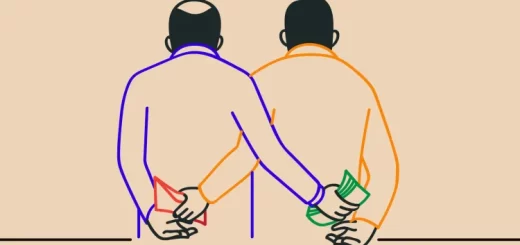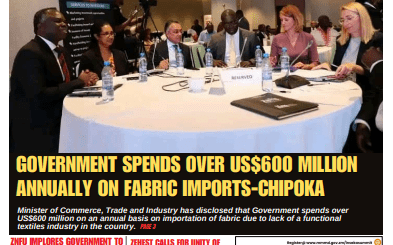The President’s Men: A cable Of Corrupt And Thieving Politicians
In the corridors of power, a storm is brewing, and its thunderclaps echo through the halls of the Zambian government. The vultures are circling President Hakainde Hichilema (HH), their talons poised to rip apart his legacy and feast on the nation’s resources.
The president’s men, a cabal of corrupt politicians, seem to have forsaken their allegiance to the Zambian people, driven instead by a ravenous appetite for wealth and power.
From the outset, President HH’s administration was marred by high expectations. He was hailed as a beacon of hope, promising to transform Zambia’s economy and eradicate corruption. However, the reality is starkly different.
His closest allies, rather than aiding him in his noble quest, have turned their backs on these promises, succumbing to the temptations of opulence and power.
This cabal of thieves and criminals, now entrenched within the government, mirrors the lifestyles of their predecessors, coveting the same luxury and extravagance.
Their tenure is seen as their time to ‘eat’, to gorge themselves on the wealth of the nation. The grand promises made to the Zambian populace while in opposition have faded into oblivion, replaced by a relentless pursuit of personal enrichment.
These individuals, tasked with combating corruption, have instead declared a covert war against the president. In backrooms and whispered conversations, they assert that President HH, being already affluent, has no need for further wealth.
This twisted justification fuels their rampant corruption, allowing them to broker deals that serve only their interests. The administration is now divided into two camps, each employing increasingly sophisticated methods to siphon national resources.
One need only look at the public scandals that have erupted to see the scale of this betrayal. The Sugilite scandal stands as a glaring example of high-level corruption. It was not an isolated incident but a symptom of a broader malaise.
Allegations suggest directives came from the highest echelons of power, implicating senior government officials. Similarly, the fertilizer and medicine procurement scandals highlight the pervasive corruption, where highly placed individuals exploit their positions for financial gain.
Even the agriculture sector has not been spared. Mismanagement and corruption have exacerbated food shortages, with insiders profiting from the misfortunes of drought-stricken regions.
This exploitation extends to land acquisitions, with new elites purchasing prime properties in the Lower Zambezi and Samfya, flaunting their ill-gotten wealth while ordinary Zambians suffer.
The pattern is the same: the powerful get richer, and the vulnerable are left to pick up the pieces.
The fuel procurement sector is another hotbed of corruption.
A dangerous cartel operates with impunity, threatening anyone who dares to challenge its dominance. These corrupt officials, sworn to uphold the constitution and serve the people of Zambia, have turned the nation into a looting ground.
Deals are struck across various sectors—mining, agriculture, fisheries, defense, tourism, home affairs, foreign affairs, and finance—all tainted by corruption.
One must question the efficacy of President HH’s intelligence apparatus. How can these corrupt officials continue to hold their positions, despite the overwhelming evidence against them?
Reports suggest that a significant number of ministers, permanent secretaries, and senior officials should be facing justice. Yet, they remain free, enjoying their ill-gotten gains and hiding their wealth in offshore accounts.
These officials have betrayed the sanctity of their presidential appointments, using their positions to enrich themselves. President HH’s administration is at a crossroads. If these corrupt elements are not purged, his administration risks being remembered as one of the most corrupt in Zambia’s history.
The specter of state capture, reminiscent of the previous regime, looms large. This time, however, it is not the lowly cadres but the highly regarded political leaders who are entangled in corrupt activities.
The betrayal is particularly painful for those who supported the administration in the hope of genuine change. The same leaders who once condemned corruption are now perpetuating it on an even grander scale.
The potential fallout from these scandals is alarming. The truth, once fully revealed, will cast a long shadow over President HH’s presidency. The impunity with which these individuals operate and their disregard for public resources are disturbing.
The rush to amass wealth at any cost is tarnishing the president’s name, whether he is aware of it or not.
Fighting corruption is not a battle that one person can win alone. It requires a concerted effort from all members of society. To think that President HH can tackle this issue single-handedly is delusional.
Corruption fights back, and it does so aggressively. The cabal of corrupt politicians surrounding the president poses a grave threat to Zambia’s potential for progress. If left unchecked, this corruption will undermine not only his presidency but the future of the nation.
President HH should be alerted to the brewing storm. The mining deals currently in play threaten to explode into full-fledged scandals. Legally granted licenses are being revoked in favor of politically connected individuals, further entrenching corruption.
Hunting licenses are being auctioned to the highest bidders under the cover of darkness, while the public is misled about suspensions. Mukula tree logs continue to be smuggled out of the country, protected by those sworn to prevent it. Mining contracts have merely shifted from pro-PF to pro-UPND political sympathizers. The vicious cycle of corruption persists, seemingly unending.
One day, the full extent of this deception will come to light, and the Zambian people will realize the depth of their betrayal. It is imperative that President HH conducts a thorough introspection of his appointees and takes decisive action to rectify this situation.
Failure to do so will indelibly stain his legacy.
The president’s men are a cabal of corrupt and thieving criminals, their actions a blight on Zambia’s aspirations for a better future. The fight against corruption must be relentless, and it must start from within.
President HH must heed the warning signs and act decisively, or risk being remembered not for his vision of transformation, but for the rampant corruption that flourished under his watch.








